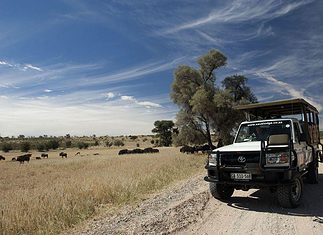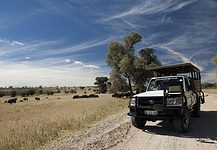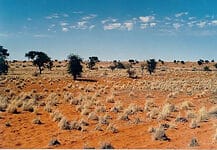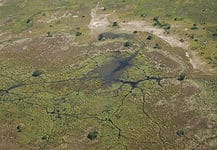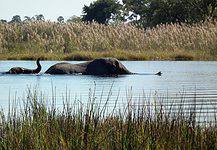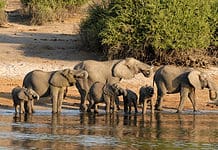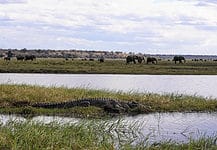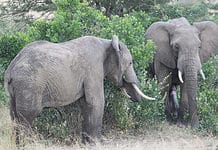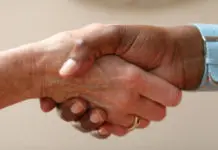Html code here! Replace this with any non empty text and that's it.
Travel to Botswana
Located in Southern Africa, Botswana is a popular country to visit due to its unique landscapes which is defined by the Kalahari Desert and the Okavango Delta. Both become lush habitats during the seasonal floods, attracting hordes of wildlife. Which is why Botswana safaris are so popular!
The Central Kalahari Game Reserve is home to numerous wildlife with its fossilized river alleys and grasslands. The unique landscape of the Okavango Delta in northern Botswana covers between 6 to 15,000 square kilometers of Kalahari Desert. The large, swampy area offers the perfect opportunity for experiencing the best African safari due to its unique landscape and plentiful wildlife.
Botswana is home to an expansive list of exotic bird species and wildlife, with Botswana having the largest elephant population in the world.
The Moremi Nature Reserve, located in the center of the Okavango Delta, is arguably one of the most beautiful wildlife sanctuaries in Africa. The varying habitats in the reserve include savannah woodlands, wetlands, floodplains and reed beds, which offer an ideal home for birds, the big five, various antelopes, giraffes and hippos.
Some of the most popular things to do in Botswana are in and around the Okavango Delta. The interesting landscape can be explored by land, water and air. More adventurous activities in the area include helicopter safaris, Chobe river cruises, traditional mokoro rides, mountain biking, horseback safaris, hot air balloon safaris, walking tours and fishing. Keen photographers will also be inundated with amazing photographic opportunities.
From the vast open water masses to the narrow winding canals, the possibilities for adventure in Botswana are endless.
Visa Requirements for Botswana
Citizens from all European member states as well as the UK, USA and *most Commonwealth countries will not need a visa before travelling to Botswana. This also applies to several Asian, African, and South and North American countries. Travelers from these countries will get a Botswana tourist visa on arrival, this will be for 30 days but can be extended for up to 90 days.
For citizens of other nations, a visa must be obtained prior to arrival. To check whether you need a Botswana visa or not, you can have a look at this website.
*Citizens of Ghana, Nigeria, India, Pakistan, Bangladesh and Sri Lanka DO require a visa to Botswana.
Important Cultural Information
The locals of Botswana are generally very friendly and welcoming to tourists. English is the official language of the country, while Setswana is the national language spoken by the locals. Greeting with ‘dumela’ (hello in Setswana) will immediately create a friendly interaction with the locals.
Most of the locals follow a traditional way of life, which visitors should respect. Outside of the urban areas and popular safari destinations, the locals may not be familiar with visitors. Casual clothing is acceptable and visitors should maintain common courtesies.
Within the Botswana safari areas it’s important to respect the nature and wildlife around you, leaving nothing but your footprints behind. Botswana is an eco-friendly tourist destination, with a strong focus on sustainable tourism.
While technically there are laws against homosexuality in Botswana, it remains unenforced with Botswana being among the most tolerant African nations with regards to the LGBT community.
Arrival in Botswana
If you are going on safari into the Delta and surrounding national parks then you will most likely arrive at Maun Airport. From there you will either transfer to your lodge via a private plane (the larger safari companies have their own), helicopter or 4×4 safari vehicle.
For a helicopter transfer contact Helicopter Horizons, for private charters contact Mack Air, Air Botswana or Wilderness Air.
If you’re using a travel agent for all of your bookings, they will be able to book all of your transfers for you.
Banking & Money
The currency in Botswana is the Pula (which means ‘rain’ in Setswana). 100 thebe is one Pula. The US dollar, British Pound, Euros and South African Rand are the easiest currencies to convert. In many cases, the locals will take your foreign currency for payment for goods / services.
Travellers cheques and foreign currency can be exchanged at banks, bureaux de change and main hotels – easily found in the main towns and cities. You can swipe with your card at most shops in the larger towns and cities as well as most hotels and safari companies, but you’ll need cash at community art and craft outlets. Major credit cards, such as Visa and MasterCard, are accepted.
Before going out on your safari, make sure that you have a select amount of cash with you to use for small purchases at local shops and tips for staff members.
The main Botswana banks include Barclays Bank Botswana, Standard Chartered Bank Botswana, First National Bank Botswana, Stanbic Bank Botswana and Bank Gaborone.
Medical Emergency Information
Take note of the following emergency contact numbers for Botswana:
- Ambulance: 997 (Toll Free)
- Police: 999 (Toll Free)
- Fire Brigade: 998 (Toll Free)
- Medical Rescue: 911 (Toll Free)
- Medical Air Rescue: 390-1601
It is extremely important for visitors to remote areas of Botswana to have comprehensive travel insurance that provides coverage for serious illness as well as accidents and medical evacuations.
It is also advisable to sign up with Okavango Air Rescue, they are the only medically staffed and equipped helicopter based rescue operation for the Okavango Delta and the Kalahari.
If you’re looking for travel insurance, we are an affiliate of World Nomads.
[/vc_column_text]
Wi-Fi and Internet
Mobile phone coverage is offered by Mascom, Orange, and be Mobile in Botswana. You’ll be able to get a local Sim card from most supermarkets and service stations. Note however that only the major towns and portions of the national highway have network coverage. When you’re deep in the bush on your safari, you won’t get any coverage.
The high-end lodges will have Wi-Fi, while a lot of the smaller campsites are unlikely to have Wi-Fi. Be prepared to be disconnected from the outside world for a few days while on safari in Botswana.
Areas of Botswana
The main Botswana tourist attractions are found within the three main regions:
The North
The northern part of Botswana is the main tourist attraction as it features the best Botswana National Parks. Here you will find the great Okavango Delta. The Chobe National Park, Selinda and Linyanti Reserves are found northeast of the Okavango Delta. While the Makgadikgadi Pans, one of the largest salt flats in the world, is located in north-eastern Botswana.
The Kalahari
The Kalahari desert dominates central Botswana, featuring the 12-acre Central Kalahari Game Reserve. This region is one of the largest protected areas in Africa and features wildlife and amazing landscape – quite different from the rest of the country.
Southeast
The Tuli Block in the southeast is possibly the least frequented by tourists, mostly due to its lesser known wildlife areas. It is home to Botswana’s capital city, Gaborone. It is also home to most of Botswana’s population.
Transportation in Botswana
Public transportation is limited outside of the cities in Botswana, and not often used by tourists. Most tourists to Botswana will book a safari through a tour company who will then organize all of their transfers, otherwise they will visit on a self-drive in their own car.
Street names and addresses are few and far between, making it a bit difficult to find your way around. Online maps don’t always provide the best routes as it sometimes includes routes that are actually fences or roads that are incomplete. Untarred roads are also best to avoid unless you have a suitable vehicle. It’s advisable to use a combination of GPS and paper maps for finding your way around Botswana.
Traveling by car is not a problem if you’re sticking to the main roads, like the Trans-Kalahari Highway. The road from Maun to Kasane is a sand road (some maps don’t indicate this), and will need a 4×4. Rather go via Nata to/from Maun/Kasane as it’s much quicker.
If you are traveling through the National Parks in your own vehicle, it will definitely need to be a 4×4. Many of the smaller roads do not come up on GPS, you will need to use paper maps and stick to the main roads. The Map Studio map of Botswana includes best 4×4 routes (available on Amazon).
Other methods of transportation in Botswana include private air charters, helicopters and boat transfers when you’re in the Delta.
Transportation In & Out of Botswana
Sir Seretse Khama in Gaborone is Botswana’s main airport, however most tourists will fly into the Maun Airport to start their Botswana safari. Most flights arriving in Botswana are via Johannesburg in South Africa, with a few from Cape Town, Nairobi and Harare. Check Expedia for available flights.
Air Botswana, South African Airways and British Airways all have flights from Johannesburg through to both Gaborone and Maun, along with local South African airlines Kulula and FlySafair. More airlines fly to Gaborone.
There are no longer any trains available coming from South Africa. There is however a bus service from Johannesburg to Gaborone – about six hours. Other bus routes are from Windhoek, Namibia and Victoria Falls in Zimbabwe. See Intercape Mainliner for more bus information. If you are entering Botswana via car, then you have a few entry points to choose from.
If you’re coming from Johannesburg, then you’ll enter in the South at Gaborone. There are also entry points from Namibia, Zambia and Zimbabwe. The primary roads within Botswana are relatively well maintained – just be on the lookout for cows, donkeys and goats on the sides of the road (as well as the occasional elephant).
Accommodation in Botswana
There are many secluded game lodges scattered throughout Botswana. Accommodation in the wilderness areas range from campsites through to luxury lodges. The popular Botswana lodges tend to book up fast so it’s best to book your accommodation well in advance. Be prepared to pay quite high prices. Booking through a travel agent may work out cheaper (and easier) than booking direct. It’s best to shop around for different options.
Accommodation in the towns and cities are usually quite easy to get as they are rarely full. Here you’ll be able to book various B&Bs, guesthouses, lodges and hotels.
Food & Dining Guide for Botswana
Local food in Botswana is similar to the rest of southern Africa, with little that interests foreign travelers. Most lodges will offer a selection of international cuisine.
Botswana is however known for its quality beef. You will find many Botswana butchery selling well-priced good quality meat, including biltong which is a local version of dried meat similar to American jerky (but way better!). A braai is a popular cuisine, equivalent to what the rest of the world refers to as a barbecue.
Botswana’s Attractions
The main attraction in Botswana is the wildlife opportunities. Nearly a fifth of the country is made up of wildlife parks. Most of these parks are rife with wildlife, including the big five and loads of antelope.
The Okavango Delta – which features the world’s largest inland delta – is a must visit for all tourists in Botswana. Located in the middle of the Kalahari, the swamp and water canals attract ample wildlife and bring great viewing opportunities. The Okavango Delta is also a UNESCO World Heritage Site as well as one of the Seven Natural Wonders of Africa. Moremi Game Reserve is the main game park within the delta.
The nearby Chobe National Park is home to a massive population of elephant, along with other wildlife while the Makgadikgadi Pans National Park attracts a large number of birds. Other popular Botswana national parks include Savuti, Nxai Pan National Park, Mokolodi Nature Reserve and Gemsbok National Park.
Tourists can partake in several different safaris in Botswana, including by 4×4, helicopter, boat, traditional mokoro, on foot or horseback.
Tsodilo Hills is another attraction in Botswana. Also a UNESCO World Heritage Site, Tsodilo Hills contains one of the largest collections of rock art on the continent.
Shopping in Botswana
Basic commodities can easily be purchased at all major towns in Botswana, including Maun and Kasane. Many regional chain stores operate in Botswana, including Spar and Woolworths.
Local arts and crafts are on sale throughout Gaborone, Maun, Kasane and other tourist areas. Some local products to look out for include woven baskets, handmade jewellery, tapestries, fabrics and clothing, woodcarvings, glassware and San crafts.
Nightlife
You won’t find much nightlife in Botswana. There are a few pubs and restaurants in the main cities as well as Maun, otherwise if you’re out in the bush then it’s just you and the stars (and if you’re lucky a few lions).
Safety Tips for Botswana
Attacks on tourists are rare in Botswana, however you may come across petty crimes in the major areas of Gaborone, Francistown and Maun. Theft from cars does occur as well as smash and grabs at traffic lights – stealing handbags and cellphones. Be alert when driving in the main cities, and always make sure to lock your vehicles and put your valuables out of sight.
There have been instances of break-ins at some lodges in the Chobe National Parks, particularly at the riverfront chalets. Make sure to lock your room when leaving.
The other main safety concern in Botswana is from the wildlife. There are very few (if any) fences in Botswana, meaning that wild animals are free to roam through campsites and lodges. Make sure to not wander from your camp at night and always have a torch with you. High-end lodges will have guards to walk you to and from your chalets at night. Be alert at all times, while respecting the wildlife around you.
Malaria, including cerebral malaria, is common in the northern parts of Botswana, including the Okavango Delta and Chobe areas. It is more prevalent during and straight after the rainy season, from November to April. Consult your doctor for whether you need to take malaria medication for your trip.
Conclusion
If you’re looking for the ultimate African safari, then you most definitely can’t go wrong with Botswana. The unique landscape is a major highlight here, with the Okavango Delta being the ultimate bucket list destination. The lush landscapes around Botswana make for amazing wildlife viewing opportunities. You will easily see hoards of wildlife on your Botswana safari, including lions, elephants, giraffes, hippos and several antelope.
While safari lodges do come at a price in Botswana, it is well worth it. Make sure to include a traditional mokoro boat ride in your itinerary and if your budget allows a helicopter scenic or hot air balloon ride. It’s also good to include a few locations in your itinerary, most travelers will visit the Chobe National Park, the Okavango Delta and the Makgadikgadi Pans.

